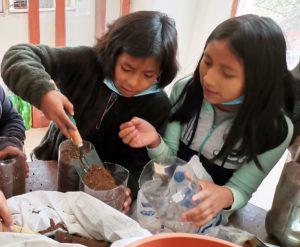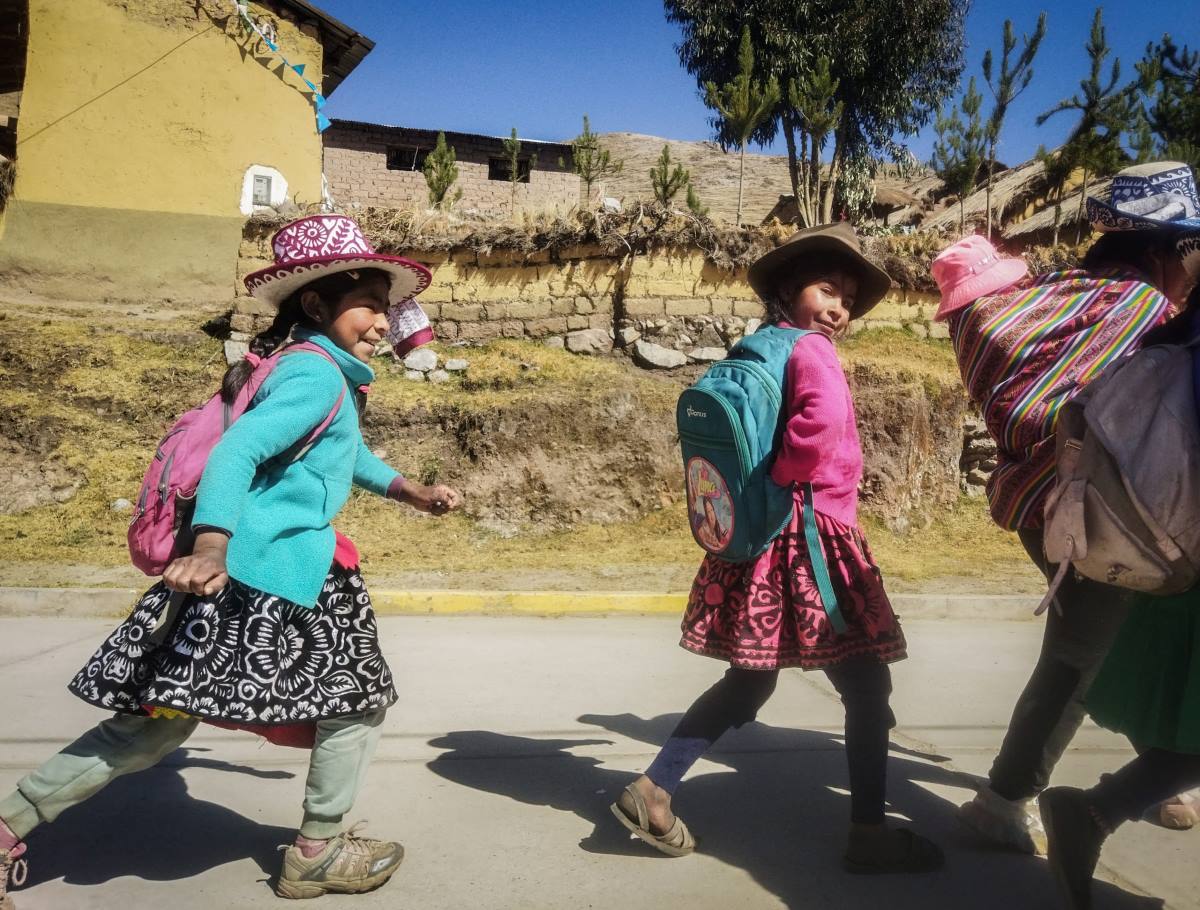The 28th World Climate Conference in Dubai ended on 13 December with the adoption of a joint agreement. At the same time, Terre des Hommes Suisse continues to work to raise young people’s awareness of the need to protect the planet. From the COP to the awareness-raising activities for children organised by Terre des Hommes Switzerland in the classroom, the fight against global warming is gaining ground every day.
The latest edition of the major annual COP 28 forum impressed with record figures – no fewer than 85,000 participants, pledges of funds totalling USD 12.8 billion from 31 of the 198 countries represented, 160 of them by their heads of state. The agreement finally adopted by COP 28, after several days of often heated negotiations, heralded the “beginning of the end” of the fossil fuel era and proclaimed the transition of societies to carbon neutrality, with the No. 1 objective being to keep global warming to a maximum of 1.5 degrees.
In response to the COP 28 agenda, a number of UN agencies and NGOs have published documents in the run-up to the conference or in response to its calls, with strong messages and exhortations to action, calling for urgent action. Omar Abdi, UNICEF Deputy Executive Director for Programmes, pointed out that
For its part, the International Federation of Terre des Hommes (TdH) issued a press release calling on “States to commit to decisive climate action aligned with their obligations on children’s rights and informed by children’s views and perspectives”. In a statement, TdH International Federation also urged COP participants to place children and their rights at the heart of decision-making processes and commitments, and to give young people a seat at the table in decision-making processes on climate in a sustainable way – at global as well as local, national and regional levels.
Working for better interaction between people and their environment
Terre des Hommes Suisse, an organisation that proudly bears its name, which is highly significant of its mission, has always worked for better interaction between man and his environment and for greater awareness among young people of the need to protect the planet.
Making children aware of the Earth’s limits, making them aware of the finiteness of its resources and training them to adopt a more responsible approach to the environment is, among other things, the aim of Terre des Hommes Switzerland’s Programme for Education for Sustainable Development and Solidarity. TdH Suisse sees education for sustainable development as one of the pillars of its activities, and promotes this programme in the 10 countries where it operates. In several of these areas, TdH Switzerland has done pioneering work in introducing people to sustainable development, particularly in terms of raising awareness of the risks of global warming.
Horacio Augstburger, national coordinator of the Programme for Sustainable and Inclusive Education in Bolivia, explains:
While promoting EDDS in Bolivian schools, Mr Augstburger became aware of the insufficient level of knowledge of environmental issues among teachers:
And it is precisely where there is a lack of knowledge and understanding of environmental issues that it is essential to be creative, subtle and inventive – abilities that are all the more essential when it comes to raising awareness among young people and educating them about sustainable development. Ensuring an interrelationship between ESD and the teaching of subjects in the school curriculum, by presenting the various aspects of the environment through their points of intersection with the subjects traditionally studied at school, is not something that is immediately obvious, and the development of original methods for building bridges between the two areas of learning can only be encouraged and welcomed.
Environmental boxes are a subtle and creative way of tackling the climate problem.
In this sense, Horacio Augstburger’s idea of offering teachers in Bolivia environmental boxes containing objects and devices that can be used to link education for sustainable development with typical ‘school’ subjects is a really good one. Also known as discovery boxes, these “boxes” will help teachers in Bolivia to explain the main issues in sustainable development by integrating its themes and terminology into those of other subjects.

“These are teaching kits that teachers can use to teach their maths, science, language and literature lessons, while talking to their pupils about the causes, consequences and solutions of atmospheric change, and asking them to write a project or solve a problem related to this issue”, explains Horacio Augstburger. – explains Horacio Augstburger, adding that “in language lessons, the teacher can ask the students to write a letter (an email) to the mayor of the town asking for permission for a reforestation project, while in maths, they can be asked to calculate the amount of CO2 a tree absorbs over a given period”.
A key formula: planetary limits
There are nine discovery boxes (environmental boxes), corresponding to the nine most salient aspects of environmental problems, also known as planetary limits. At the top of the list, climate change is perhaps the most worrying of these limits, but not the only one. The other eight relate to biodiversity, the phosphorus and nitrogen cycles, the ozone layer, freshwater, ocean acidification, changes in land use, chemical pollution and air pollution.
Launched two years ago, the first Discovery Box addresses the issue of climate change. Already 40 copies of this first “box” have been distributed and 1,500 pupils have had access to it in Bolivia. The idea is that these numbers should increase each year and that, despite the fairly high cost of manufacturing the boxes, by 2025 the “Bolivian” experience of Terre des Hommes Switzerland, which is currently at the pilot stage, should also be extended to schools in Colombia and Peru.
Through this original and inventive way of raising young people’s awareness of important aspects of Terre des Hommes Switzerland’s Programme for Education for Sustainable Development and Solidarity, Horacio Augstburger hopes to contribute to a change in consciousness in this region of South America and to greater awareness of the consequences of global warming.
Bolivia and Peru - two countries severely affected by climate change
In Bolivia and Peru, these consequences are being felt even more urgently than elsewhere: melting glaciers that are struggling to refill, creating water supply problems; disruption of the rainy season, which is becoming rarer and less plentiful, even though many crops depend on it in the absence of a modern, reliable irrigation system.
Quand on prend en compte aussi la sécheresse dans l’Altiplano andin et, résultant de ce cataclysme, le dessèchement de Titicaca, entre la Bolivie et le Pérou – situation exceptionnelle qui voit l’eau de ce bassin considéré comme le lac le plus haut du monde (3812 m d’altitude) atteindre son plus bas niveau depuis 1943 – on obtient le tableau complet des conséquences du réchauffement climatique dans cette partie du globe, conséquences qui appellent une action urgente et face auxquelles toute indolence devient inexcusable.
In this part of the world, as elsewhere, climate change is shaking up the planet’s equilibrium and bringing with it all sorts of disturbances and disruptions. Once again, the group most vulnerable to its harmful consequences are young people, especially children – children who need to be protected as much as possible, but who also need to be made aware of the need to take action.
Acting at their own level, learning to love the Earth, carrying out actions that contribute to its survival – this is the essence of the training that Terre des Hommes Switzerland wants to give young people through its Programme for Education for Sustainable Development and Solidarity. The often very creative and original ways in which the national coordinations of TdH Switzerland decide to apply EDDS in the various countries where our organisation is active (we have already seen the very successful experience of our representatives in Bolivia) help to make this programme even more attractive, as well as effective.

